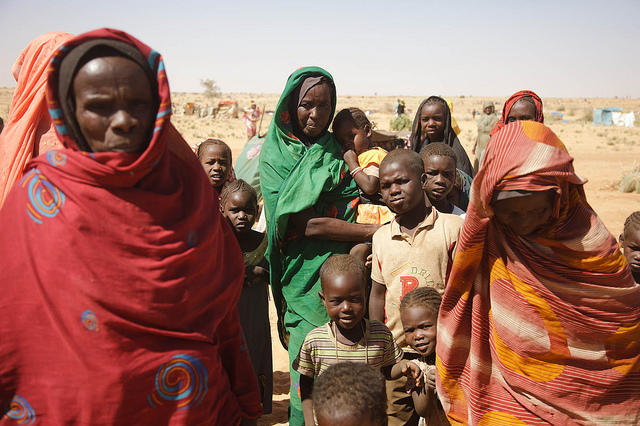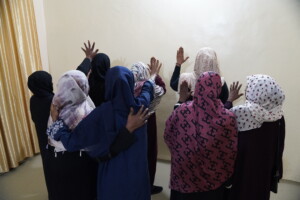Gender-based violence ‘a weapon of war’ in Sudan and Darfur

Displaced women and children in Zamzam camp near El Fasher, North Darfur (File photo: UNAMID)
Sudan has experienced a concerning rise in sexual and gender-based violence (SGBV) since the onset of war between the Sudan Armed Forces (SAF) and the Rapid Support Forces (RSF) on April 15. The African Centre for Justice and Peace Studies expands on the use of SGBV as a weapon on war, and highlights the role of women in empowering the peace process in the war-torn country.
On Wednesday morning, the Women’s Peace and Solidarity Conference with Sudan began its proceedings in the Kenyan capital, Nairobi. Hala El Karib, regional director of the Strategic Initiative for Women in the Horn of Africa (SIHA Network), emphasised in her opening speech that the escalating violence against civilians in Sudan, particularly women, directly stems “from impunity and the neglect of accountability by international actors”.
A new report by the African Centre for Justice and Peace Studies (ACJPS) reveals a pattern of harmful actions targeting Sudanese people based on gender, with women’s organisations documenting over 120 verified cases of rape as of October 2023, and fears that the actual number may be higher.
ACJPS defined SGBV as “a range of harmful actions and behaviours that target individuals based on their gender, imposing physical, sexual, psychological, and socio-economic suffering”. It can include a wide spectrum of acts, “including but not limited to sexual assault, rape, domestic violence, human trafficking, and sexual exploitation”.
The report drew parallels between the situation in Darfur today and “the genocidal war of the mid-2000s” in Darfur. Sudan’s history of conflict sees various armed factions, including the RSF, SAF, and militia groups, using SGBV as a weapon of war to intimidate local populations and control resource-rich areas, ACPJS explained.
More than four million women and girls in Sudan are at risk of sexual violence, according to the World Health Organisation (WHO). The Women’s Future Organisation recorded 103 incidents of rape in South and West Darfur as of August 2023, as reported by ACJPS. The UN Joint Human Rights Office in Sudan received credible reports of more than 50 incidents of sexual violence linked to hostilities by November 2, impacting at least 105 victims, with 70 per cent of confirmed incidents attributed to men in RSF uniforms.
Collecting accurate data in Sudan is extremely difficult given “poor phone connections, frequent power cuts, difficulties in tracking survivors who have fled to neighbouring countries, and fear of reprisals hindering survivors from speaking out”.
“Female human rights defenders, journalists, and activists have not been spared either. They have been raped or threatened with rape to intimidate them and stop them from doing their work”, says Lilian Ajok, legal program officer at ACJPS.
Women’s role in peace
In the face of insufficient empowerment systems, ACJPS highlights local women’s organisations taking a leading role in the Sudanese peace process. The Peace for Sudan Platform, supported by the United Nations Women Sudan Country Office, encompasses over 49 women-led initiatives and organisations. Prioritising protection and psychological support for SGBV survivors, these initiatives also aim to increase women’s participation in building sustainable peace.
The UN Women Sudan Country Office has also established situation rooms, ACJPS reports, to document, monitor, and raise awareness about conflict-related sexual violence. A comprehensive referral system for survivors, coupled with a range of services, including clinical, psychological, and legal support, seeks to provide much-needed assistance amid this dire situation.
To ensure women play a pivotal role in shaping Sudan’s future and fostering inclusive peace, a holistic approach is essential, asserts Christine Kirabo, legal program officer at ACJPS. This involves “providing women with substantive representation in peace negotiations”, allowing them significant roles in decision-making processes.
Kirabo writes that urgent legal reforms should encompass ratifying the Maputo Protocol* and domesticating CEDAW**, “aligning Sudan’s laws with international standards” to offer comprehensive legal protection for women.
Collaboration with international organisations is crucial for sustained efforts in advancing women’s rights, “which includes implementing capacity-building programs”.
Fostering public awareness is key to challenging stereotypes and biases that impede women’s active participation in peace processes. Finally, investing in capacity-building initiatives is vital to empower women in leadership and advocacy roles, “ensuring they have the skills and resources necessary to bring about meaningful change”.
The full SGBV report is accessible on the ACJPS website.
The ACJPS overview of Sudanese women’s role in the peace process can be accessed here.
* The Maputo Protocol, officially the Protocol to the African Charter on Human and Peoples’ Rights on the Rights of Women in Africa, is an international legal instrument adopted by the African Union. It focuses on promoting and protecting the rights of women in Africa, addressing various issues such as violence against women, child marriage, and discrimination.
** The Convention on the Elimination of all Forms of Discrimination Against Women (CEDAW) is an international treaty adopted in 1979 by the United Nations General Assembly, and ratified by 189 states. It covers a broad range of areas, including political participation, education, employment, and healthcare, and calls for legal reforms and affirmative actions to ensure women’s equal rights and participation in all aspects of society.











 and then
and then